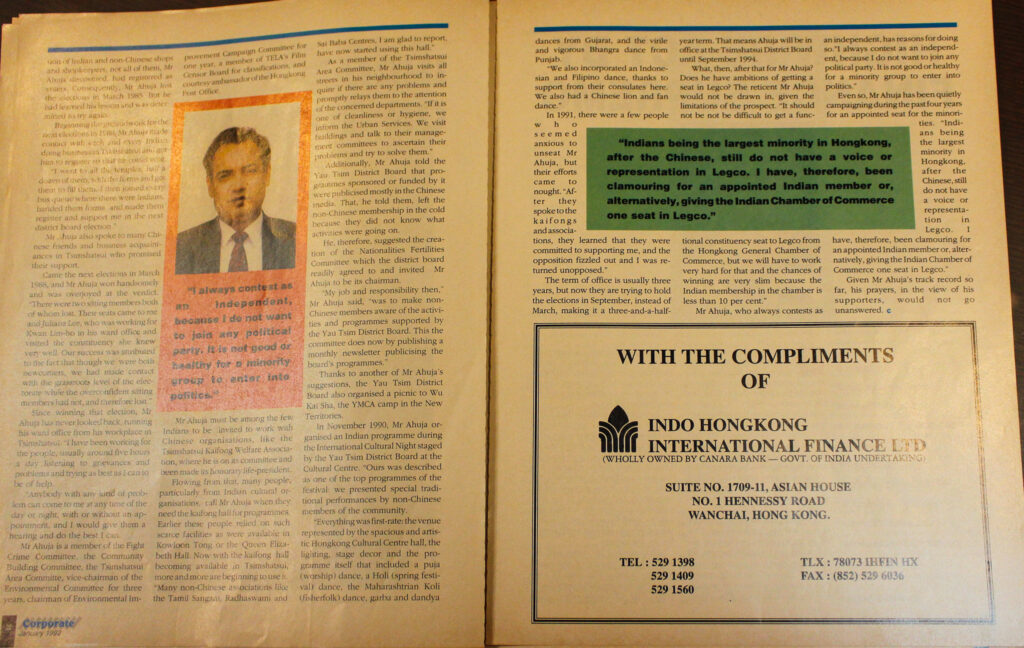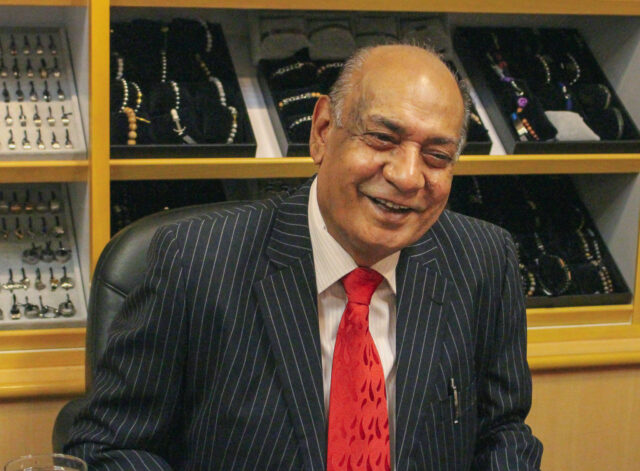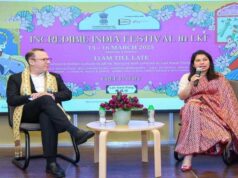With an ‘open-door’ policy for any person seeking help, Gary Ahuja is the first Indian businessman to be elected as District Council in Hong Kong. Brinda Khandwala discovers how the self-made man maintains his simplicity even at the peaks of success with wisdom and warmth
Tell us about running for the district council office for the very first time.
By 1985, by the grace of God, business was running successfully. I wanted to get involved in community work. It was then that I read in the newspapers about nominations starting for district council elections. TST had two seats. I decided to contest from TST. When I registered, I was given a list of voters. That’s when I realized there were hardly any registered Indian voters. One had to fill a form to become a registered voter, but so many Indians weren’t even aware about this.
We were 6 candidates of which I was the first and only Indian to contest. I not only lost, I lost badly! The two elected candidates had around 1800 and 1600 votes respectively, while I, with the third highest votes, had only 320. But this gave me some knowledge. And in ’88, I contested again.
There was a visible change in the voting pattern since the first time you contested. How did that come about?
Firstly, I helped Indians residents of TST to register for voting. I canvased by personally visiting Indian homes and helping them fill the forms for voting.
The two elected candidates of the previous tenure were confident of winning the seats again. Mostly because almost 98 percent of the population back then was Chinese. The remaining was expat minorities which included not only Indians but Pakistanis, Nepalese, British, American, Japanese, Korean, Singaporean…
I contested knowing that I possibly have one percent of a chance to win the election. But not many Chinese showed up to vote – the turnout, as usual, was barely 25 percent. On the other hand, by late evening until 10 pm, a lot of Indians queued up to vote! I won.
TVB immediately announced on the news – ‘Indian businessman creates history in Hong Kong to be the first Indian to win the district council election’.
You won again in ’91, ’94 and ’99 (unopposed) despite contesting in a predominantly Chinese community. Did that surprise the people?
I remember in 1994, TST had become a single-seat constituency and I was one of the six candidates contesting. A journalist called me before the election to ask – who I thought was my strongest opponent. My response was, “Do I have an opponent?” She asked the same question to the other five candidates, to her surprise all of them named me! I won that election with 53 percent votes in my favour.

How did you garner popularity among the non-Indians?
These aren’t Indian elections, they are Hong Kong election. For me, all the people in my constituency are equally important. Everyone knows my office is open in the day for anyone who is seeking help. So many people come even without appointment.
I remember there was a gentleman who called me with a problem asked on what day he could come to meet me. I said to him, “You have a problem now, so you are welcome to come now.” He came, I offered him suggestions and he returned relaxed knowing that his problem will be soon resolved.
What brought you to Hong Kong 50 years ago?
I was a simple man, working in Ulhas Nagar with Century Rayon (Birla Group). Before that I had worked with Hindustan Antibiotics in Pimpri (Pune). A friend from Hong Kong called me and said that being a free port, the opportunities is Hong Kong are great to build a future. So I took his advice and came here.
How did you get the title of ‘King of Watchbands’?
I started with trading general merchandise – everything from handbags, kitchware, toys and more. On my first business trip I had six suitcases with me – going to the Middle East and then Europe. I remember in Germany I was told that only two bags are allowed in each taxi. So, I was travelling with an entourage of 4 taxis!
Over time, with experience, I learned the watch bands were a popular item and it takes only one briefcase to travel with them. Of course, then jewelry came into fashion, we so got into that too.
You’ve been organizing a lot of community activities. How do you make time for it?
Everything is possible, if you want to do it. Over time I was able to spend more time on community work because the staff was managing business. It started when my brother once came to me saying he wanted to place a full page ad in SCMP to wish Indian kids a Happy Children’s Day on 14th November. While it was thoughtful, I felt it wouldn’t mean anything to a majority of the readers since the Children’s Day date is only significant to Indians – who are a very small minority here. I suggested we have a carnival for the community kids instead.
The event was a huge success. Since then we have been organizing Children’s Day events and Diwali Balls, sometimes combined when the dates are in the same week. But its not just these special days. I have also organized cultural days, health camps and picnics for the community here.
With the on-going protest against the extradition bill, what is the situation of the expat community here?
The expat community should not, and has not involved itself with the protest. In my view, there is no wrong side – neither the government not the protestors. They have their reasons to do what they are doing. Simply said, there is a democratic party and a pro-government party. There is no party that says – love Chine, love Hong Kong. There is a need for a party like that to open the discussion on what China wants from Hong Kong. China is very powerful. But all it seems to want is for Hong Kong people to love China.
Expats need not worry. As this situation wont last forever. If it does, it will turn into a civil war and the place will become like Syria – then everyone is affected, not just expats. But I don’t see it happeming to HK. The protestors need to realise they violence is wrong. If they are peaceful, the police need not use force.
Gary Ahuja’s 10 commandments to a successful life
- Rise early. It makes you more productive and efficient.
- My personal philosophy which I have always lived by and share with my very own children, has always been that ‘work is worship’.
- According to Bhagavad Gita, regarded as one of the highest sources of ancient spiritual knowledge in Hinduism, Lord Krishna counselled Arjuna to ways face his fears and do his duty. He further counsels him to not be attached to the fruits of his actions but rather be determined to carry out his duty successfully
- Never hurt another person’s feelings. I believe in ‘karma’, which is synonymous to Newton’s law – to every action there is a reaction. Similarly, the Bible says, ‘do unto others as you would have them do unto you’.
- Never waste valuable resources – such as our environment. Water should be consumed economically. Save natural resources for our future generations. Wasting water or wasting food is selfish behavior. It’s a grave mistake which we will regret when our children will not have access to enough supply.
- Time is another valuable resource. We all get 24 hours each day – if cherished and used wisely, it can be an advantage. Translating Kabir’s poetry, ‘tomorrow’s task should be done today, and today’s task should be done now’. Take action now.
- Enjoy evenings and holidays with family. The driving force behind most successful people is ‘family’. Lord Ganesha says, ‘praying to one’s parents is as close to praying to God’. Look up the beautiful story of Lord Ganesha and his brother Karthikeya about the importance of respecting parents.
- Keep learning. Never believe you know it all. Be a humble student of life – ask good questions, listen more and talk less. Success comes to those who are ready to absorb more knowledge.
- Enjoy the diversity of cultures and various arts. These enrich one’s life.
- Be grateful, at least once a day or more.
As published in A-DesiFlava magazine’s Sept-Oct 2019 issue





